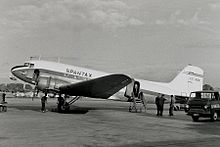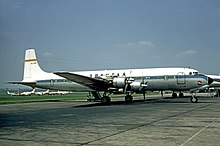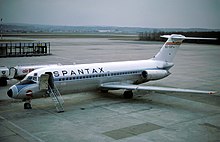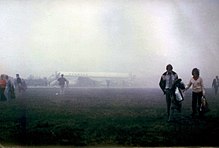Spantax
| Spantax | |
|---|---|

|
|

|
|
| IATA code : | BX |
| ICAO code : | BXS |
| Call sign : | SPANTAX |
| Founding: | 1959 |
| Operation stopped: | 1988 |
| Seat: |
Madrid , Spain |
| Turnstile : | |
| Home airport : | Gran Canaria Airport |
| Fleet size: | 14th |
| Aims: | National and international |
| Spantax ceased operations in 1988. The information in italics refer to the last status before the end of operation. | |
Spantax SA was a Spanish charter airline based in Madrid and based at Gran Canaria Airport . Between 1965 and 1982 she was involved in a series of serious accidents and significant mishaps that earned her a bad reputation, especially in Germany.
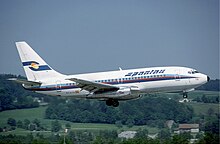
history
First years
The later Spantax - an acronym - was founded as Span ish Air Tax i Lineas Aereas SA on October 6, 1959 by Rodolfo Bay Wright and Maria Estades Saez, former employees of Iberia , in Tenerife . Originally, the company mainly transported drilling equipment and crews to oil fields near El Aaiún in what was then the Spanish Sahara .
In 1963 the name was changed to SPANTAX SA and first the intra-European, then in 1972 the transatlantic charter air traffic was added. Spantax finally flew to destinations in 21 countries, including the USA and Canada , South America , Asia and Scandinavia . In 1984 1.6 million passengers were carried.
At times, the acquisition of a Concorde was considered, with which passengers from Scandinavia should have been transported. The machine was supposed to circle around the British Isles to the north and head for the Canary Islands during the flight west of the coast of Ireland at supersonic speed .
Development in the 1980s
Spantax experienced a major setback when, in autumn 1983, the three package tourism companies TUI , ITS and NUR announced that they would no longer extend their contracts with Spantax, as German tourists had confidence in the airline's safety as a result of the series of accidents and breakdowns (see below) had lost. Only Clipper Flugreisen in Stuttgart was the last German travel company to include Spantax flights to Spain in its program. The company was never able to recover from this extensive elimination of one of its most important markets.
1986 Rodolfo Bay Wright resigned from his chairmanship and the nearly bankrupt company was incorporated into the state holding Patrimonio Nacional. In June there were strikes by flight personnel and ground crews on two weekends, so that the company was forced to rent third-party aircraft in order to be able to meet its transport obligations. The aim of the strikes was, on the one hand, to raise wages and, on the other hand, to guarantee the long-term preservation of jobs, as employees had to fear that they would be fired if they were taken over by another company.
In April 1987, the US $ 50 million indebted company was completely sold to the Aviation Finance Group in Luxembourg. They invested around 40 million US dollars in the purchase of new machines and a significant improvement in service in order to improve Spantax's image.
During the negotiations with China Airlines about the purchase of two Boeing 767s , negotiations about the financing failed, so that the company had to file for bankruptcy on March 29, 1988 . A large number of the 815 employees then temporarily blocked Palma de Mallorca airport to draw attention to their situation.
fleet
At times Spantax operated a remarkable variety of different types of aircraft, including the Convair Coronado's largest European fleet with 14 units :

- EC-ASJ Beechcraft C-45H 1962-1973
- EC-DTR Boeing 737-2K5, 1983-1988
- EC-DUB Boeing 737-2K5, 1984-1988
- EC-DUL Boeing 737-2T4, 1984-1985
- EC-DVE Boeing 737-204, 1984-1985
- EC-DXK Boeing 737-204, 1985-1986
- EC-DYZ Boeing 737-2E3, 1986-1988
- EC-DZH Boeing 737-2H4, 1986-1986
- EC-EEG Boeing 737-229, 1987-1988
- EC-BJC Convair CV-990A-30-5, 1967–1987 (collided on March 5, 1973 over Nantes with an Iberia DC-9, could land damaged in Cognac )
- EC-BJD Convair CV-990A-30-5, 1967-1983
- EC-BNM Convair CV-990A-30-5, 1968-1970 (accident in Stockholm on January 5, 1970)
- EC-BQA Convair CV-990A-30-5, 1970-1985
- EC-BQQ Convair CV-990A-30-5, 1969-1986
- EC-BTE Convair CV-990A-30-5, 1970-1981
- EC-BXI Convair CV-990A-30-5, 1971-1981
- EC-BZO Convair CV-990A-30-5, 1972–1988 (still at the airport of Palma de Mallorca today )
- EC-BZP Convair CV-990A-30-5, 1972-1984
- EC-BZR Convair CV-990A-30-5, 1972–1972 (accident on Tenerife December 3, 1972)
- EC-CNF Convair CV-990A-30-6, 1975-1982
- EC-CNG Convair CV-990A-30-6, 1975–1982 (landed in Cologne on April 4, 1978 without landing gear extended ; returned to service on August 3, 1978)
- EC-CNH Convair CV-990A-30-6, 1975-1983
- EC-CNJ Convair CV-990A-30-6, 1975-1981
- EC-BPE DeHavilland DHC-6-200, 1968-1978
- EC-CAO DeHavilland DHC-6-300, 1972-1977
- EC-CJI DeHavilland DHC-6-300, 1974-1981
- EC-DCB DeHavilland DHC-7-102, 1978-1981
- EC-ACX Douglas C-47A-DL, 1963–1966 (accident on Tenerife September 16, 1966)
- EC-ANV Douglas C-47B-DK, 1966-1966
- EC-AQB Douglas C-47A-DK, 1960-1968
- EC-AQE Douglas C-47B-DK, 1960–1972 (accident near Madrid September 30, 1972)
- EC-AQF Douglas C-47B-DK, 1960-1976
- EC-ARZ Douglas C-47A-DK, 1962–1965 (accident on Tenerife December 7, 1965)
- EC-ASP Douglas C-47B-DK, 1964-1968
- EC-ATT Douglas DC-3A-191, 1963-1971
- EC-AXS Douglas DC-3A-197, 1964-1977
- EC-BEC Douglas DC-3D, 1966-1971
- EC-BED Douglas DC-3D, 1966-1971
- EC-BEG Douglas DC-3C, 1966-1970
- EC-ACD Douglas DC-4-1009, 1962-1973
- EC-ACE Douglas DC-4-1009, 1962-1973
- EC-ACF Douglas DC-4-1009, 1962-1972
- EC-APQ Douglas C-54A-DO, 1966-1974
- EC-AUY Douglas C-54D-DC, 1963-1971
- EC-AXM Douglas DC-4-1009, 1964-1964
- EC-BMI Douglas C-54, 1967-1970
- EC-AZX Douglas DC-6, 1965-1979
- EC-BBK Douglas DC-6B-ST, 1965-1975
- EC-ATQ Douglas DC-7C, 1964–1970 (accident near Madrid October 2, 1970)
- EC-ATR Douglas DC-7C, 1963-1977
- EC-BBT Douglas DC-7C, 1965–1976 (today located at Aeródromo de El Berriel airfield on Gran Canaria)
- EC-BDL Douglas DC-7C, 1966-1979
- EC-BDM Douglas DC-7C, 1966-1974
- EC-BNG Douglas DC-7CF, 1967-1969
- EC-BSP Douglas DC-7CF, 1969-1977
- EC-BSQ Douglas DC-7CF, 1970-1979
- EC-CCF Douglas DC-8-61CF, 1973-1984
- EC-CCG Douglas DC-8-61CF, 1973-1984
- EC-CZE Douglas DC-8-61, 1977-1988
- EC-DVB Douglas DC-8-61, 1984-1988
- EC-DVC Douglas DC-8-61, 1984-1988
- EC-EAM Douglas DC-8-61, 1986-1987
- EC-CGY Douglas DC-9-14, 1974-1983
- EC-CGZ Douglas DC-9-14, 1974-1984
- EC-DIR Douglas DC-9-14, 1980-1984
- EC-DQP Douglas DC-9-32, 1982-1983
- EC-DQQ Douglas DC-9-32, 1982-1983
- EC-DSV Douglas DC-9-32, 1983-1984
- EC-DTI Douglas DC-9-32, 1983-1983
- EC-DEG Douglas DC-10-30CF, 1978–1982 (accident in Málaga on September 14, 1982 see: Spantax flight 995 )
- EC-DSF Douglas DC-10-30CF, 1982-1984
- EC-DUG Douglas DC-10-30, 1984-1986
- EC-EAZ Douglas DC-10-10, 1986-1987
- N52UA Douglas DC-10-10, 1988-1988
- N917JW Douglas DC-10-10, 1987-1989
- EC-EFJ McDonnell Douglas MD-83, 1987-1988
- EC-EFK McDonnell Douglas MD-83, 1987-1988
- EC-BFV Fokker F-27-100, 1967-1972
- EC-BNJ Fokker F-27-100, 1967-1976
- EC-BPJ Fokker F-27-100, 1968-1972
- EC-BPK Fokker F-27-100, 1968-1972
- EC-BRN Fokker F-27-100, 1969-1972
- PK-FDR Fokker F-27-100, 1969-1969
Incidents
The history of the Spantax has been overshadowed by a number of serious accidents and significant incidents. The company suffered eight total losses of aircraft; in seven of them a total of 248 people were killed. Full list:
- On December 7, 1965, a Douglas DC-3 ( aircraft registration number EC-ARZ ) got into a tailspin after taking off from Tenerife-Los Rodeos Airport and crashed almost vertically. All 32 inmates were killed.
- On September 16, 1966, a Douglas DC-3 (EC-ACX) , which was operated for Iberia , suffered engine damage two minutes after taking off from Tenerife-Los Rodeos Airport. During the necessary ditching , a passenger who had refused to leave the plane drowned. All other 23 passengers and three crew members survived (see also Iberia flight 261 ) .
- On January 5, 1970, when a charter flight was taking off from Stockholm to Palma de Mallorca, an engine failure was noticed. The start was canceled and the Convair CV-990 (EC-BNM) machine rolled back to the terminal. Afterwards, the plane was to be flown to Zurich for repairs with only three functioning engines without passengers . During takeoff, the machine got out of control in bad weather and strong winds, grazed some treetops and eventually crashed. Five of the ten crew members died (see also the Spantax flight accident near Stockholm ) .
- On October 2, 1970, a Douglas DC-7 C of Spantax (EC-ATQ) was irreparably damaged at Madrid-Barajas airport . People were not harmed; other details are not known.
- On September 30, 1972, a Douglas DC-3 (EC-AQE) of the Spantax crashed during a training flight at Madrid-Barajas Airport when the pilot who was being trained pulled the wheel too abruptly. One of the six crew members was killed.
- On December 3, 1972, the worst accident occurred to a Spantax machine. On the flight from Los Rodeos Airport (today: Tenerife North) to Munich-Riem , the Convair CV-990 EC-BZR got out of control during take-off with almost zero visibility at about 90 m altitude, overturned and finally crashed on the ground. All 148 passengers (mostly German vacationers) and 7 crew members died. This was also the worst accident ever to a Convair 990 (see Spantax flight 275 ) .

- On March 5, 1973 was probably due to a navigational error on the part of Spantax pilots and air traffic controllers strike in a collision of a Convair CV-990 Spantax ( EC BJC ) with a Douglas DC-9-32 ( EC-BII ) of Iberia in Nantes airspace . While the Spantax machine was able to make an emergency landing with a badly damaged left wing and all occupants survived, all 68 occupants of the Iberia-DC-9 were killed. The pilots of both machines flew without the support of the French air traffic control, which was on strike that day (see Iberia flight 504 ) .
- In February / March 1976 there was a series of food poisoning caused by salmonella-contaminated food, as a result of which five people died and several became ill, some of whom were hospitalized .
- On April 4, 1978, another serious incident occurred at Cologne-Bonn Airport : As it later turned out, the pilots of a Convair CV-990 (EC-CNG) had forgotten to extend the landing gear and start the Spantax machine with 146 people After landing, board slid "on his stomach" over the runway, causing the right wing to catch fire. Only two fire trucks of the airport fire brigade that happened to be in the immediate vicinity probably prevented the deaths in this accident. Until the late 1980s, this event was ridiculed by tourists as the notorious "Spantax landing" and subtly contributed to the airline's further loss of confidence.
- On August 13, 1980, a Learjet 35A from Spantax (EC-DFA) was flown on the approach to Palma de Mallorca Airport ( Spain ) during a visual approach 8 kilometers north of it into the mountains. In this CFIT ( controlled flight into terrain ), all four occupants, two crew members and two passengers, were killed.
- On September 13, 1982, during the take-off of a leased McDonnell Douglas DC-10 ( EC-DEG ) in Málaga on a flight to New York , strong vibrations occurred due to the right tire on the nose landing gear bursting. The vibrations irritated the pilots, who then aborted take-off much too late . The machine got over the end of the runway , crossed a motorway and came to a halt on the embankment of a railway line. It broke into three parts and finally burned out. Of the 394 occupants, 50 were killed (see Spantax flight 995 ) .
"Finkenwerder Airlines"
On May 31, 1967, a demonstration flight took place with journalists and representatives of travel companies from Palma de Mallorca to Hamburg . A total of 128 passengers and nine crew members were on board. To prove the reliability of his company, Spantax President and Co-Founder Rodolfo Bay Wright flew the Convair CV-990 Coronado . On the approach to Hamburg, however, he mistook the 3000 meter long runway 05 at Hamburg-Fuhlsbüttel airport - for which he had already been granted landing permission - with the then only 1360 meter long runway of Hamburger Flugzeugbau GmbH (now Airbus ) in Hamburg-Finkenwerder . It came to a stop just a few meters before the end of the runway, which was actually much too short for the jet. The passengers got away with the horror and were taken to the other airport by bus, while the Coronado, which was then largely freed of ballast and kerosene, took off empty in the direction of Fuhlsbüttel and there - to the relief of the air traffic controllers in the tower , who had initially believed in a crash - clearly landed late. This incident earned Spantax the nickname “Finkenwerder Airlines” among professional pilots. In the crime scene episode AE612 without a landing permit , this incident serves as a stimulus to end an aircraft hijacking.
See also
Web links
Individual evidence
- ↑ Spantax accident statistics , Aviation Safety Network (English), accessed on January 14, 2018.
- ^ Accident report DC-3 EC-ARZ , Aviation Safety Network (English), accessed on January 19, 2016.
- ^ Accident report DC-3 EC-ACX , Aviation Safety Network (English), accessed on January 14, 2018.
- ^ Accident report CV-990 EC-BNM , Aviation Safety Network (English), accessed on January 20, 2016.
- ^ Accident report DC-7C EC-ATQ , Aviation Safety Network (English), accessed on January 14, 2018.
- ^ Accident report DC-3 EC-AQE , Aviation Safety Network (English), accessed on January 14, 2018.
- ^ Accident report CV-990 EC-BZR , Aviation Safety Network (English), accessed on January 20, 2016.
- ↑ Article on shz.de
- ↑ Article on Spiegel Online
- ↑ Article on zeit.de
- ^ Accident report Learjet 35 EC-DFA , Aviation Safety Network (English), accessed on August 2, 2020.
- ^ Accident report DC-10 EC-DEG , Aviation Safety Network (English), accessed on January 14, 2018.
- ↑ Open jaw flight with Spantax: How an airplane briefly disappeared in Hamburg 50 years ago , shz.de from May 30, 2017 (accessed on September 1, 2018)
- ↑ Jet giant landed on Finkenwerder abendblatt.de from June 1, 1967, pp. 1 + 20 (accessed on September 1, 2018)
